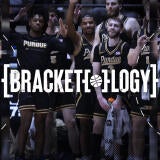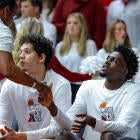Metta World Peace says he was approached multiple times to throw games while playing in college
The man formerly known as Ron Artest said he was offered $35,000 one time to fix a game as a player at St. John's
Metta World Peace, the basketball player formerly known as Ron Artest, told Yahoo Sports that on multiple occasions he was approached to fix games when he played for St. John's in the late 1990s.
The 18-year NBA veteran specifically noted he was once offered $35,000 to throw a St. John's game, and that he was approached in his neighborhood. He did not specify who attempted to bribe him.
"I've been approached in college," Metta World Peace admits in the video embedded below. "I got approached a couple times to throw games. The one interesting time, they come to me in my neighborhood and say, 'Hey, you know, I got $35,000 for you.' I'm like, 'All right, that's cool. I'll take $35,000.' They said, 'We need you to throw a game.' I said, that's when I'm like, 'You a—hole.' But it crossed my mind: $35,000 to throw a game? Not bad. But, you know, that's the problem. When you don't have no money, they find these kids that don't have money and attack them. But it's like, what if I was some kid that was a little scared? 'OK, I'll do it.'"
Here's the context and tone of Artest's response:
.@MettaWorldPeace says he was offered $35,000 💸 to fix games in college and because of that he’s not a fan of the new ruling to make sports betting legal. pic.twitter.com/G6FkMZg9fT
— Yahoo Sports (@YahooSports) May 16, 2018
The discussion with World Peace came up this week, in light of the Supreme Court's decision to enable states to allow legal betting on sports. He is opposed to this, specifically because it could endanger impressionable players in college.
"That's the problem I have with betting, because these guys that are betting, some of them are bullies, and they'll force a kid into a situation, and then, when the kid's trying to go the NBA, they hold it against the kid," he said.
College basketball has suffered from point-shaving scandals in the past. Most infamously, City College of New York, which won both the 1950 NCAA Tournament and 1950 NIT championship, was found to have been the primary school involved in a seven-team scandal of point shaving, which was found to have taken place across 86 games from 1947-1950. Boston College (1979), Tulane (1985), Arizona State (1994), Northwestern (1995), Toledo (2008) and San Diego (2010) have also been popped for game-fixing scandals over the years.
According to experts in Las Vegas who track betting lines and monitor gambling activity, the reason college basketball, and other sports, don't fall victim to point shaving is because of the rigorous attention to detail that's supervised by professionals. It's because the stakes are so high for the integrity of the betting world that game fixing and point shaving get exposed to begin with. Still, with legal sports betting set to take place in plenty of states in the coming months and years, concerns about the fallout from the Supreme Court's decision may not fade for a long time.


















